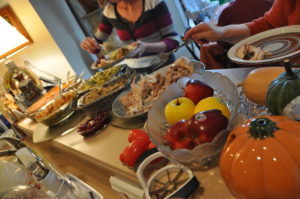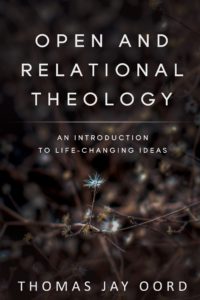A Thanksgiving Prayer to an Uncontrolling God
The uncontrolling love view has positive implications for prayer at Thanksgiving. Thanking an uncontrolling God makes a lot of sense. Thanking a controlling God doesn’t.
Each November, Americans gather to celebrate the Thanksgiving holiday. Words of thanks sometimes enter the public news or get expressed at civic gatherings too.
It’s natural to wonder, “What do people mean when they say, ‘Thank you, God?’”

No God
Some people don’t believe in God. Many of them feel thankful, but their Thanksgiving language has no ultimate Referent. In their view, no Divine Being exists to which their gratitude ultimately points. Giving thanks may be their way to admit they’ve enjoyed goodness the past year.
Sometimes, these people say, “Thank you, God.” But their disbelief in a Being to whom they should be grateful makes this confusing.
All God
Those who say God controls everything — let’s call their view, “All God” — express gratitude at Thanksgiving. They believe God directly or indirectly controls everything.
In their prayers, All God advocates say, “Thank you, God, for ____.” They can insert any event whatsoever. Such events might be supremely joyful or utterly horrific. The God who controls everything is responsible for every act of respect and rape, for peace and pain, for havens or holocausts.
Most All God prayers focus on what’s good. Reminding All God advocates their God causes evil can dampen their holiday spirit!
The Allowing God
Others who pray reject the idea God causes evil. But they claim God allows it.
When these people give thanks, they try to sidestep the problems that come with saying God allows evil. They might blame free agents or natural forces. But they try to avoid asking why a God who can stop evil singlehandedly permits it. The God who can control others fails to prevent the dastardly deeds we endure.
The Allowing God permitted the pandemic, the holocaust, and your sister’s rape.
When those who say, “God allows evil” pray at Thanksgiving, they could insert any event into the “Thank you, God, for _____” sentence. The Allowing God gets ultimate credit and blame for causing or allowing all things.
The Uncontrolling God of Love
Thanksgiving prayers make better sense in the uncontrolling love perspective. Advocates of this view thank God for always giving freedom, agency, or existence to creatures and creation. And God presents a spectrum of possibilities to each creature in each moment. In giving and presenting, the uncontrolling God never controls.
The uncontrolling God is the gracious source for all that’s good. This God actively loves moment by moment by providing, inspiring, empowering, and interacting with creation.
Genuine evil comes when creatures fail to respond well to God’s call to love. Or evil comes from natural accidents and free processes of reality. In the uncontrolling love of God view, God does not cause nor allow evil.
A Thanksgiving Prayer that Makes Sense
In her Thanksgiving prayer, an advocate of the uncontrolling love view can say every good and perfect gift originates in God. An active but uncontrolling God is the source of goodness and blessing. And this God neither causes nor allows evil, as if God could singlehandedly produce or prevent it.
The good we enjoy involves creaturely responses to God’s gracious action too. The uncontrolling love view supports our urge to thank creatures at Thanksgiving. God is not the only factor, actor, or force for good. Creatures can cooperate with God’s good work. As I say in Open and Relational Theology, an amipotent — not omnipotent or impotent — God exerts the power of love.
Most believers thank other people at Thanksgiving. They know creatures can join with God to do good. It’s right to thank God as the source of goodness and those who cooperate with God.
At Thanksgiving, it’s right to thank the Creator and the cook!
Widely Indebted
The more we realize how interrelated the universe is and how much God loves in an uncontrolling way, the more we understand how widely we are indebted. A Thanksgiving meal is possible because of God’s action, a chef or chefs, farmers, those who transport food, those who make the plates, tables, and homes we use when celebrating, plants, animals, and so many more.
God inspires goodness throughout all creation. We have many reasons to be thankful… and many actors to thank!
Thanksgiving Prayer
In light of this, here’s a thanksgiving prayer that aligns with the view that God always loves in uncontrolling ways…
“We thank you, our loving God, for being the source of all that’s good.
You also empower and inspire the good we receive from others.
We’re thankful to humans and nonhumans for cooperating with your love.
We’re grateful people because you’re a good and loving God!”
At Thanksgiving, we can thank an uncontrolling God of love for being the source of all things good, without implying God causes or allows all things evil. Share on X

Comments
Helpful in its timeliness and clarity!
It would be great to have an actual prayer as an example of what you’re talking about. Did I miss the sample prayer?
Good idea! I’ll add that when I get a chance.
Came here after seeing your upcoming Meetup event. I definitely appreciate your post! I’m 99% following your reasoning.
I am a little tripped up in the “active but uncontrolling God is the source of goodness…but can’t singlehandedly prevent evil.” versus the “gets…blame for …allowing all things.” The reason for the “can’t singlehandedly prevent evil” is clearly due to free will and the rule (is that the right term?) that free will not be overridden by God lest we simply be slaves? So if free will is the key, then the “singlehandedly” element refers not fighting against his will, but rather requires our active participation and choosing to follow his lead in all the options he presented to us in the moment mentioned above.
Your framing is he is exclusively a source of good and simply never the source of bad things, which makes sense. Is there any risk of him being percieved as actively not providing good things to those in need? And how do we rationalize through the people who just never seem to get a positive break (from god?). The biblical Job comes to mind here, which is where I’m struggling a bit.
The A bit of clarity would help, even if it is a link out to a related post that clarifies this.
After re-reading this, I’m still a little lost on the “god does not allow” perspective. Is it not reasonable to have this view, but believe that god will not violate free will to enforce it? He could stop it, but he plays by his rules, so he cannot (maybe better said as “will not”).
Thanks, Scott. I can see your argument. I think the “cannot” is better for a number of reasons. I address the issue in various places, including this blog: https://thomasjayoord.com/index.php/blog/archives/god-cant-making-sense-things
Thanks, Scott. I’m seeing this note after responding to your other note. If what I said in that note doesn’t answer your questions, please let me know.
Thank you, sir, as always. Your explanation is spot-on, in my mind,
This is troubling in that God does seem to allow or not prevent evil. It is difficult for me to wrap my head around this as it seems like process theology where God cannot do anything to prevent evil but can only influence good through people. I have not been able to buy in to that view, but I understand why it is valid to many, because just the presence of evil is a challenge to a good God. May theories try to explain evil in light of a good and possibly all powerful God. I have no better idea about this, but the only one I can hang my hat on was presented by Dr. Bruce McCormack in his 2015 lecture “The Passion of God Himself: the Cry of Dereliction in Barth’s Theology” I do not want to spoil this for anyone wanting to listen, but Dr. McCormack in the opening part of the lecture said (and I paraphrase) “If I could not tell the story of Christ in the way I am about to talk about, then I could not tell it”.
I liked this way of introducing God’s work of partnering into the Thanksgiving conversation. Re. questions of God’s allowing evil, perhaps an uncontrolling God
invites everyone into partnership but allows everyone to decline the invite……much as when we allow others to decline our own best ever Thanksgiving feast.
Thank you for your work on “Open and Relational” theology, and how it pertains to a prayer of thanksgiving. I have a question. You speak of God “providing”. How does God do this? How much is God actively involved in bringing about change? Thanks for your answers.
James – Sorry for the delayed response. I think God provides…alongside creatures. So the provision always requires positive cooperation. I think God ALWAYS acts to bring about positive change, but sometimes creatures don’t cooperate or the conditions are not right for this change.
Thanks for your good response, Curt. To your first sentence, I’d say it only makes sense to say God allows evil if God could prevent it singlehandedly. But I don’t think God can do that. As for our common friend, Bruce M., one might interpret his inability to tell the story in any other way than he does a failure of his imagination! Not necessarily that he’s telling the most accurate story.
Thanks, Kyle!
Is God selective in sending all good things? In some things it is hard to see any or very few good things.